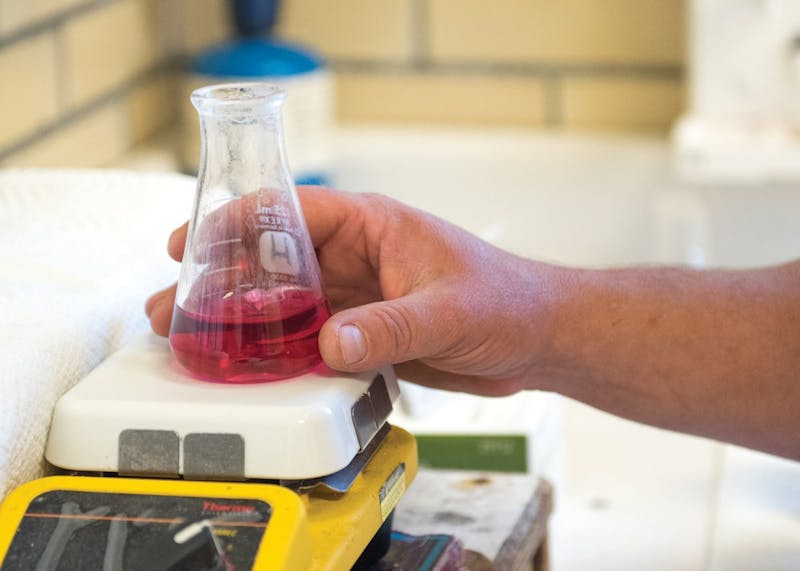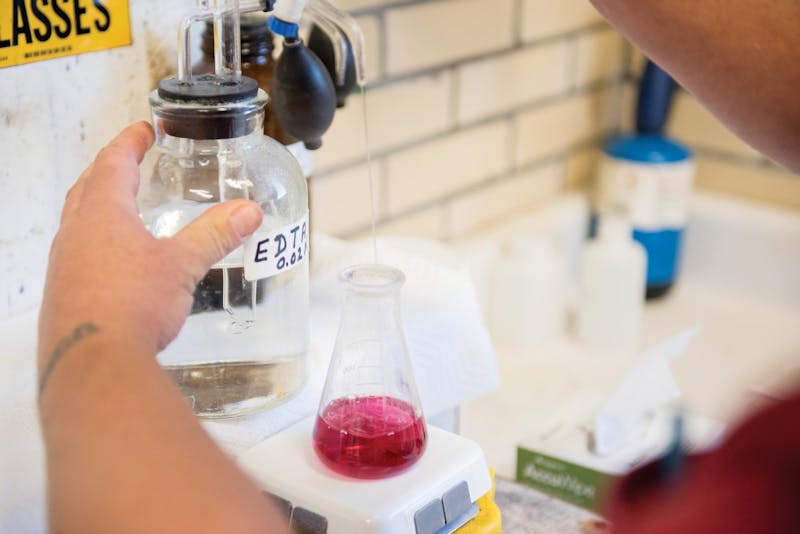
CARL FONTICELLA
Shawn Beasley, plant manager at the Athens Water Treatment Plant poses for a portrait.


CARL FONTICELLA
Shawn Beasley, plant manager at the Athens Water Treatment Plant poses for a portrait.
When the City of Athens issued a boil order for two blocks on the east side of town on Monday, Oct. 10, Phil Perry didn’t find out until the next day.
Perry, an Athens resident who lives on Dalton Avenue, said he did not have to boil any water, but began to use bottled water as soon as he found out.
Such boil orders are typically a precautionary measure city officials take when Athens’ water lines could potentially become contaminated, Andrew Stone, Athens’ Public Works director and city engineer, said.
But the city’s water almost never becomes contaminated, he said, and the water meets quality standards set by the Environmental Protection Agency, according to recent data.
Through maintaining water lines and protecting water wells, city and county officials work to ensure residents like Perry are drinking clean water.
The City of Athens issues boil orders when pollutants — such as metals or bacteria — could potentially enter the city’s water lines, Stone said.
“If we ever can’t guarantee (water is safe), we issue a boil order,” Stone said.
Boil orders usually happen when the pressure in the city’s water lines falls below 20 psi, or pounds of pressure per square inch. Pressure in the city’s water pipes keeps out contaminants, he said, and if the pressure drops, contaminants may get in the water supply.
The city issues boil orders through email and text notifications, announcements on local radio stations, social media and an alert website. The orders recommend residents in a particular area boil their water before drinking it or using it to prepare food.
From 2011 to 2015, the city had an average of about 23 boil orders per year, according to data from the Athens Engineering and Public Works Department.
Many problems can cause boil orders, Stone said, including pump malfunctions and line breaks.
“Water lines are under pressure for years and years, and over time, they degrade and don’t have capability to hold that (pressure),” he said.
The boil orders give the city time to test water for contamination after a problem arises.
“In the last 35 years, there’s only been one sample that’s come back with a contamination problem,” he said. “Almost always, the water is fine.”
In Perry’s case, the city issued a boil order for parts of Dalton Avenue and Grand Park Boulevard due to ongoing water line improvements.
“They’ve been working on it for about three weeks,” Perry said.

CARL FONTICELLA
The Athens Water Treatment Plant is 58 years old, and the machinery has remained the same since it opened. Despite the age of the machinery, Plant Manager Shawn Beasley is confident in its functionality.
From a regulation standpoint, Athens’ public water is acceptable, according to local and national data.
The city tests its water quality multiple times per day in different areas and sends data to the Ohio EPA, Stone said. The agency regulates all public water in the state, Ohio EPA spokeswoman Heidi Griesmer said.
Athens had only two health-based violations in the past 10 years, according to the EPA’s Safe Drinking Water database, and the last time such a violation occurred was in 2009.
Athens’ water is pulled from the ground using wells. The city has 17 wells, mostly located around the west side of the city, which stretch 30 to 60 feet deep into aquifers, Stone said. Aquifers are porous layers of rock that contain and release water, according to the U.S. Geological Survey.
“Each well has a pump on it and pumps water out of the ground and sends it to the water treatment plant,” Stone said.
The Athens Water Treatment Plant, 395 W. State St., filters and aerates the water and adds chemicals to treat the water, such as chlorine, he said. At the plant, the city monitors for dirt, metals and “organic contaminants,” or germs.

CARL FONTICELLA
Athens Water Treatment Plant manager Shawn Beasley conducts a water test in the plant's laboratory. The water starts out pink, but after spinning for four minutes turns blue, indicating that it is positive.
The EPA sets national standards for the amount of contaminants allowed to be in water, and Athens met every standard, according to laboratory test results in the city’s 2016 drinking water Consumer Confidence Report.
One drinking water contaminant — lead — has been in the spotlight in recent years following the water crisis in Flint, Michigan.
Flint switched to a new water supply in 2014, causing its drinking water to have high lead levels from corrosive supply pipes, according to NPR.
Lead in drinking water can cause “delays in physical or mental development” in infants and children, according to the EPA, and it can cause kidney problems and high blood pressure in adults.
“What happened in Flint is that they had a surface water source and pulled it out of the Flint River, and the river was extremely corrosive,” Stone said. “(Athens has) never had a lead issue.”
Athens has low levels of lead that fall below the EPA maximum, according to the consumer confidence report.
In tests conducted last year, Athens’ water had 2.5 ppb of lead, while the EPA’s maximum was 10 ppb. In comparison, Flint’s water had 27 ppb of lead, almost double the EPA limit, according to a Washington Post report.
The Athens public water system monitors levels of corrosiveness in water in its wells at the treatment plant, according to the report, but lead can still be a problem for homes with old pipes.
“Water that sits in pipes unused for extended periods of time (months or more) still has the potential to leach lead from those pipes,” the report states, adding residents should run the water for a few minutes if using water from old, unused pipes for drinking.
Ohio has nine current lead advisories, but none are present in southeastern Ohio, according to the Ohio EPA’s drinking water advisory map.
Much of the Public Works department’s job involves monitoring the wells in what is called the Wellhead Protection Area, Stone said. The area’s aquifers lack a protective layer of clay in the ground above it.
“If something were to be spilled on the ground, it could contaminate the aquifer pretty easily,” Stone said. “So we have an area of the city (where) we have rules about use of pollutants and chemicals that people can use and store.”
The city’s Wellhead Protection Plan restricts the use and storage of potentially polluting chemicals and prohibits certain land use and construction activity.

CARL FONTICELLA
Athens Water Treatment Plant manager Shawn Beasley conducts a water test in the plant's laboratory. The water starts out pink, but after spinning for four minutes turns blue, indicating that it is positive.
The city inspects facilities and tests wells regularly, Stone said, and contamination instances are very rare.
“We’ve never had a situation where contamination has made it into an actual water well,” he said.
The Athens Public Water System provides drinking water to about 24,000 people, according to the EPA, which is more than a third of the population of Athens County. The county has a total of 16 public water systems.
Jack Pepper, director of environmental health at the Athens City-County Health Department, said boil orders do not affect private water systems. But for public water systems, such as the one in Athens, they are a common occurrence.
So far in 2016, the city already issued 23 boil orders, according to the city’s data.
Though the city issued a boil order Monday, another Athens resident, Stephanie Foster, hadn’t heard about it.
“I had the idea that there was one,” Foster said, referring to water line construction in front of her house on Grand Park Boulevard. “But I usually drink bottled water.”
Stone said residents usually don’t need to worry about boil orders, unless they have an immune system deficiency or another medical issue listed on the city’s website.
“If I have a boil order in my house, I typically drink the water,” he said.